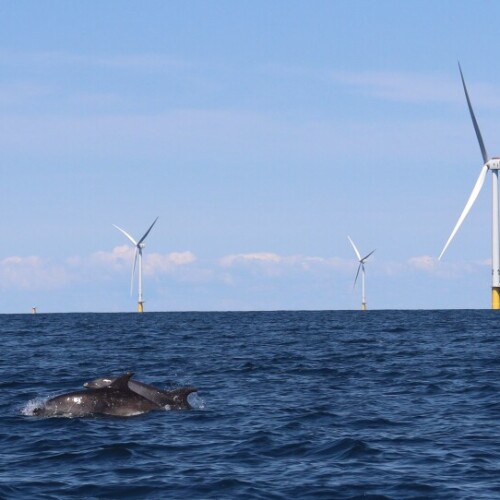An environmental studies professor at Brown University is at the center of a fight that he says underscores the politics of wind energy.
J. Timmons Roberts and the Climate and Development Lab at Brown he leads, published work documenting the connections between the fossil fuel industry and groups opposed to offshore wind farms. Now, a law firm representing opponents of wind power is demanding that Brown retract his findings, according to the New York Times. The request comes after the Trump administration dealt a blow to local wind energy production, halting construction of the Revolution Wind wind farm off the Rhode Island coast.
Roberts spoke with Morning Host Luis Hernandez about his research and his response to the letter from Marzulla Law L.L.C.
Interview Highlights
On whether he was surprised to receive a letter from the law firm Marzulla Law L.L.C.
J. Timmons Roberts: No. I’ve received several of these threatening letters from law firms representing these anti-offshore wind groups. And each time, Brown University responds — the general counsel responds with a letter saying, you know, “This is academic freedom. We don’t tell professors and students what work to do.” And then we’ve not heard back. Basically, the requests have gone away.
This one though, was a little different. There were two differences when I read it: The first was this sort of threat against Brown University’s funding overall — that is, the whole university’s science funding. The language was “We’re preparing coordinated reports to key public and private funding bodies, including the National Science Foundation, the Department of Energy and the Mellon Foundation. And the second thing was that it was from this Washington-based firm, Marzulla Law, who for decades now, they’ve been representing extractive firms, lumbering firms, mining firms, oil and gas companies, including some of the largest ones.
On whether these kinds of legal threats could have a chilling effect on academic research
Roberts: Yes. Certainly, the threats do have a chilling effect, broadly. I think scientists and social scientists are waking up to the fact that they can’t expect to just live in an ivory tower.
They really have to stand up for their work — explain why it’s important, explain what they’ve found in ways that the public can understand. And then we need to protect ourselves with more security on our communications, with lawyers — frankly, we have to lawyer-up. It’s a sad case, but it’s part of our work when we’re being threatened like this.
On lessons he has learned
Roberts: You know, I said to my colleagues: these are times that will test our resolve, but it gives us opportunities to tell our story. People appreciate that Brown University is saying, “This is academic freedom and it needs to be defended.” That’s a profile in courage, and people need some of these profiles to stand up themselves. It’s really an important moment for people to be brave.








